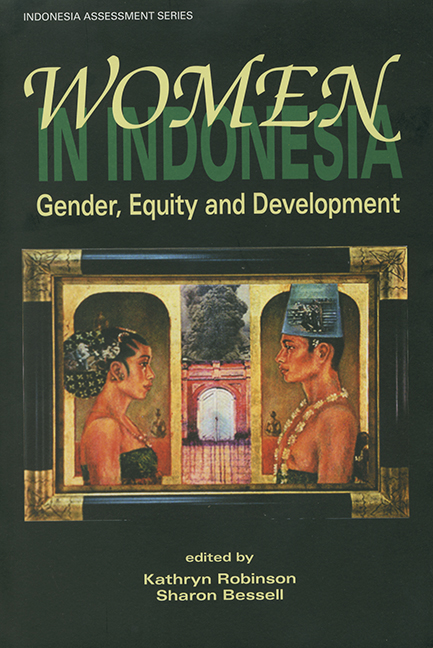Book contents
- Frontmatter
- Contents
- Tables
- Figures
- Contributors
- Acknowledgments
- Glossary
- Prologue
- 1 Introduction to the Issues
- 2 The Mega Factor in Indonesian Politics: A New President or a New Kind of Presidency?
- 3 The Downfall of President Abdurrahman Wahid: A Return to Authoritarianism?
- 4 The Year in Review: From Blind Man's Bluff to Mega Expectations
- 5 Further Comments on the Economy, with a Gender Perspective
- 6 Institution Building: An Effort to Improve Indonesian Women's Role and Status
- Commentary
- 7 Feminism in Indonesia in an International Context
- 8 Gay and Lesbi Subjectivities, National Belonging and the New Indonesia
- 9 And the Winner Is … Indonesian Women in Public Life
- 10 Indonesian Women Artists: Transcending Compliance
- 11 Literature, Mythology and Regime Change: Some Observations on Recent Indonesian Women's Writing
- 12 Women and the Labour Market during and after the Crisis
- 13 Women's International Labour Migration
- 14 Customary Institutions, Syariah Law and the Marginalisation of Indonesian Women
- 15 Women's Grassroots Movements in Indonesia: A Case Study of the PKK and Islamic Women's Organisations
- 16 Women's Activism against Violence in South Sulawesi
- 17 Gender Mainstreaming and Sex-disaggregated Data
- 18 The Changing Indonesian Household
- 19 Women, Family Planning and Decentralisation: New Variations on Old Themes
- 20 Men, Women and Community Development in East Nusa Tenggara
- References
- Index
- INDONESIA ASSESSMENT SERIES
3 - The Downfall of President Abdurrahman Wahid: A Return to Authoritarianism?
Published online by Cambridge University Press: 21 October 2015
- Frontmatter
- Contents
- Tables
- Figures
- Contributors
- Acknowledgments
- Glossary
- Prologue
- 1 Introduction to the Issues
- 2 The Mega Factor in Indonesian Politics: A New President or a New Kind of Presidency?
- 3 The Downfall of President Abdurrahman Wahid: A Return to Authoritarianism?
- 4 The Year in Review: From Blind Man's Bluff to Mega Expectations
- 5 Further Comments on the Economy, with a Gender Perspective
- 6 Institution Building: An Effort to Improve Indonesian Women's Role and Status
- Commentary
- 7 Feminism in Indonesia in an International Context
- 8 Gay and Lesbi Subjectivities, National Belonging and the New Indonesia
- 9 And the Winner Is … Indonesian Women in Public Life
- 10 Indonesian Women Artists: Transcending Compliance
- 11 Literature, Mythology and Regime Change: Some Observations on Recent Indonesian Women's Writing
- 12 Women and the Labour Market during and after the Crisis
- 13 Women's International Labour Migration
- 14 Customary Institutions, Syariah Law and the Marginalisation of Indonesian Women
- 15 Women's Grassroots Movements in Indonesia: A Case Study of the PKK and Islamic Women's Organisations
- 16 Women's Activism against Violence in South Sulawesi
- 17 Gender Mainstreaming and Sex-disaggregated Data
- 18 The Changing Indonesian Household
- 19 Women, Family Planning and Decentralisation: New Variations on Old Themes
- 20 Men, Women and Community Development in East Nusa Tenggara
- References
- Index
- INDONESIA ASSESSMENT SERIES
Summary
In late 2000 and throughout the first half of 2001, Indonesian politics was dominated by the drawn-out crisis of the Abdurrahman Wahid presidency. Serious problems in the government began shortly after Abdurrahman's appointment to the presidency in October 1999. As Mietzner (2001: 29) noted in the last political report in this Indonesia Assessment series, ‘By [the first month after his election], the first minister had been sacked, with six more to follow before the formation of a new cabinet in August 2000’. From the very first months in office, the pattern of politics was set, with Abdurrahman rapidly losing the support of the coalition of parties that had put him in power and, as a result, entering into an increasingly confrontational relationship with the legislature. An early denouement had seemed possible during the annual session of the People's Consultative Assembly (MPR) in August 2000, but the president saved his position by ceding much of the daily responsibility for government to his vice-president, Megawati Sukarnoputri (although this remained a paper concession and was not seriously implemented by the president in subsequent months).
It did not take long for the confrontation between the president and parliament to resume with renewed force. In July, before the MPR session, almost 237 of the 500 members of the People's Representative Council (DPR) had signed a letter proposing that it formally investigate allegations that the president had been involved in the improper use of Rp 35 billion from Bulog, the national food logistics agency, and had improperly received a donation of US$2 million from the Sultan of Brunei. On 23 August Abdurrahman announced a new cabinet, dashing the hopes of the political parties for greater representation. Within a week, the DPR had agreed to pursue the graft allegations; shortly thereafter it established a special committee (pansus) to investigate them. By October 2000 there was open press speculation that this process would result in Abdurrahman's removal from office (‘Kasus Bulog, Sandungan Buat Presiden?’, Kompas, 20 October 2000).
The first major blow to the president came on 1 February 2001, when the DPR voted 393 to 4 to accept the pansus report that there was circumstantial evidence of his direct involvement in the two scandals, and that he had violated his oath of office and an MPR decree on elimination of corruption.
- Type
- Chapter
- Information
- Women in IndonesiaGender, Equity and Development, pp. 28 - 40Publisher: ISEAS–Yusof Ishak InstitutePrint publication year: 2002



